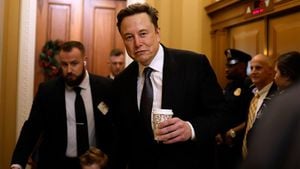The world of high finance often intertwines with high-profile individuals whose activities can influence markets, trend behaviors, and sometimes lead to controversial legal challenges. Recently, several articles have shed light on the intriguing lives and financial maneuvers of multi-millionaires, showcasing their investment shifts, unique travel experiences, and legal disputes.
One major trend involves the rapid evolution of cryptocurrency investments. According to recent reports, many wealthy investors are abruptly shifting away from Ripple (XRP)—a once-prominent player considered the ultimate solution for cross-border payments—towards newer opportunities like Coldware (COLD). Ripple's decreasing momentum, as it battles increasing legal uncertainty and waning confidence, is prompting significant investors, often termed 'whales', to look elsewhere.
Coldware, described as the next big thing capitalizing on decentralized infrastructure networks (DePIN), has garnered substantial appeal among investors seeking high-growth potential. Initial fundraising for Coldware saw it net $700,000 within its first week, attracting those eager to ride the next wave of blockchain innovation.
Ripple has not lost its loyal clientele completely, but according to reports, its price has recently dropped by 5.75%, raising concerns about its market resilience. The legal skirmishes with the SEC have hampered its growth and institutional adoption, motivating previous XRP investors to seek alternatives like Coldware, which promises greater scalability and practical application.
Transitioning to the world of real-life experiences, two American millionaires, Jeff Grinspoon and Jon Thomas Foley, explored Vietnam recently, perfectly blending opulence with local interactions. Their trip, organized by All Asia Vacation (AAV), emphasized authentic Vietnamese culture, from visiting traditional markets to engaging with local chefs and farmers.
Throughout their 17-day itinerary, the millionaires traversed through key regions like Hanoi, Ha Giang, Hue, Da Nang, and Ho Chi Minh City. A highlight of their adventure included visiting the Chau Long market, where they learned to cook local dishes and tried their hand at unique Vietnamese cuisine. They also got close to nature via helicopter tours of Ha Giang and partook in hands-on farming experiences with local villagers—a refreshing departure from typical luxury tourism.
This fascination with authentic experiences among the affluent showcases not only their wealth but also their growing desire for meaningful engagement with different cultures. Traveling to Vietnam, Grinspoon and Foley reportedly also have investment interests, particularly spotting opportunities within the shoe production and real estate sectors.
On another financial note, the narrative of Anton T., age 81, encapsulates the legal and financial intricacies high-profile millionaires often face. T., known for inventing a pivotal emergency medical device, found himself embroiled in tax disputes stemming from relocating his tax residence from Zurich to Zug. While the Zug authorities welcomed the couple as new taxpayers, their continued use of both residences incited investigation from Zurich’s tax authorities.
The back-and-forth over T.’s true residence status highlights not only the complications of tax evasion but also the scrutiny of wealthy individuals maneuvering through financial regulations. Eventually, the federal tax authorities ruled against T., demonstrating the rigidity and thoroughness with which tax regulators pursue affluent individuals attempting to minimize their tax obligations.
This case is particularly notable as it reflects broader trends where wealthy taxpayers navigate complex systems to optimize their finances, often facing tougher scrutiny as they do so. The economic disparity between regions like Zurich and Zug—where the former has many high taxes and the latter is seen as more tax-friendly—plays significantly when determining where wealthy individuals choose to reside.
Scrutinies are not unique to T. or business magnates. A similar investigation had taken place against the former Novartis CEO Daniel Vasella, who also attempted to shift his tax residence. It reveals the magnitude of vigilance exercised by tax authorities, aiming to curtail perceived exploitation of tax advantages by wealthy individuals.
The combination of these narratives—the migrations between cryptocurrencies, the experiences of affluent travelers, and the legal entanglements of millionaires—paints a vivid picture of the diverse financial landscapes these individuals navigate. Whether it’s exiting from XRP due to legal complications, exploring the rich cultures of Southeast Asia, or enduring the scrutiny of tax authorities, the lives of millionaires remain anything but mundane.
Understanding the financial choices these elite individuals make can offer valuable insights for those aspiring to navigate wealth—highlighting the need for savvy investment, cultural awareness, and adherence to legalities. Reflecting on these stories sheds light on not only the luxuries these millionaires enjoy but also the challenges they face, reminding us of the intricacies inherent within the world of wealth.



